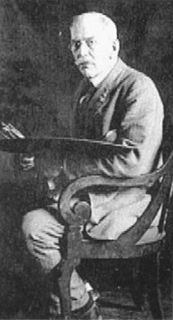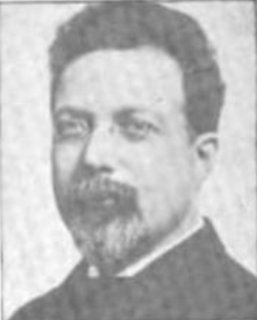Related Research Articles

Benjamin Franklin was an American polymath who was active as a writer, scientist, inventor, statesman, diplomat, printer, publisher, and political philosopher. Among the leading intellectuals of his time, Franklin was one of the Founding Fathers of the United States, a drafter and signer of the United States Declaration of Independence, and the first United States Postmaster General.

Harold Eugene "Doc" Edgerton, also known as Papa Flash, was an American scientist and researcher, a professor of electrical engineering at the Massachusetts Institute of Technology. He is largely credited with transforming the stroboscope from an obscure laboratory instrument into a common device. He also was deeply involved with the development of sonar and deep-sea photography, and his equipment was used by Jacques Cousteau in searches for shipwrecks and even the Loch Ness Monster.

Stewart Culin was an American ethnographer and author interested in games, art and dress. Culin played a major role in the development of ethnography, first concentrating his efforts on studying the Asian-Americans workers in Philadelphia. His first published works were "The Practice of Medicine by the Chinese in America" and "China in America: A study in the social life of the Chinese in the eastern cities of the United States", both dated 1887. He believed that similarity in gaming demonstrated similarity and contact among cultures across the world.
Buddhist Hybrid Sanskrit (BHS) is a modern linguistic category applied to the language used in a class of Indian Buddhist texts, such as the Perfection of Wisdom sutras. BHS is classified as a Middle Indo-Aryan language. It is sometimes called "Buddhist Sanskrit" or "Mixed Sanskrit".
Mlaḥsô or Mlahsö, sometimes referred to as Suryoyo or Surayt, is an extinct or dormant Central Neo-Aramaic language. It was traditionally spoken in eastern Turkey and later also in northeastern Syria by Syriac Orthodox Christians.

Cyrus Adler was an American educator, Jewish religious leader and scholar.

Charles Rockwell Lanman was an American scholar of the Sanskrit language.

Joseph Rodefer DeCamp was an American painter and educator.

Elisha Kent Kane was a United States Navy medical officer and Arctic explorer. He served as assistant surgeon during Caleb Cushing's journey to China to negotiate the Treaty of Wangxia and in the Africa Squadron. He was assigned as a special envoy to the United States Army during the Mexican–American War and as a surveyor in the U.S. Coast Survey.

Morris Jastrow Jr. was a Polish-born American orientalist and librarian associated with the University of Pennsylvania.
Edward Digby Baltzell Jr. was an American sociologist, academic and author. He studied the White Anglo-Saxon Protestant establishment and is credited with popularizing the acronym WASP. He was also a best-selling author whose books were popular with both scholars and the general public.
Albert Galloway Keller was a sociologist, author, and student and colleague of William Graham Sumner. He is best known as the editor of Sumner’s papers, in numerous volumes, published in the early 20th century by the Yale University Press. He was a scholar in his own right and wrote on German colonial policy, economic geography, and sociology.
The American Society for Psychical Research (ASPR) is the oldest psychical research organization in the United States dedicated to parapsychology. It maintains offices and a library, in New York City, which are open to both members and the general public. The society has an open membership, anyone with an interest in psychical research is invited to join. It maintains a website; and publishes the quarterly Journal of the American Society for Psychical Research.

David Philipson was an American Reform rabbi, orator, and author.
William Norman Brown was an American Indologist and Sanskritist who established the first academic department of South Asian Studies in North America and organized the American Oriental Society in 1926. He was the Professor of Sanskrit at the University of Pennsylvania for most of his academic career. He was president of the Association for Asian Studies in 1960. He is considered the founder of the field of South Asian Studies, which he pioneered in his career over four decades at the University of Pennsylvania, where he helped to found the Department of Oriental Studies (1931), and later single-handedly founded the Department of South Asia Regional Studies (1948). These departments are now survived by the departments of East Asian Languages and Civilizations, Near Eastern Languages and Civilizations, and South Asia Studies. W. Norman Brown also founded the American Institute of Indian Studies, which was located in the Van Pelt Library at the University of Pennsylvania.

The Boston Camera Club is the leading amateur photographic organization in Boston, Massachusetts and vicinity. Founded in 1881, it offers activities of interest to amateur photographers, particularly digital photography. It meets weekly from September to June. Membership is by dues and open to the public. Meetings are open free to the public.

Nationalist Clubs were an organized network of socialist political groups which emerged at the end of the 1880s in the United States of America in an effort to make real the ideas advanced by Edward Bellamy in his utopian novel Looking Backward. At least 165 Nationalist Clubs were formed by so-called "Bellamyites," who sought to remake the economy and society through the nationalization of industry. One of the last issues of The Nationalist noted that "over 500" had been formed. Owing to the growth of the Populist movement and the financial and physical difficulties suffered by Bellamy, the Bellamyite Nationalist Clubs began to dissipate in 1892, lost their national magazine in 1894, and vanished from the scene entirely circa 1896.
Franklin Edgerton was an American linguistic scholar. He was Salisbury Professor of Sanskrit and Comparative Philology at Yale University (1926) and visiting professor at Benares Hindu University (1953–4). Between 1913 and 1926, he was the Professor of Sanskrit at the University of Pennsylvania. He is well known for his exceptionally literal translation of the Bhagavad Gita which was published as volume 38-39 of the Harvard Oriental Series in 1944. He also edited the parallel edition of four recensions of the Simhāsana Dvātrṃśika, and a reconstruction of the (lost) original Sanskrit text of the Panchatantra.

Sarah James Eddy was an American artist and photographer who specialized in the platinotype process, also known as platinum prints. She was active in abolition, reform, and suffragist movements, and was a philanthropist as well as instrumental in the founding of the Rhode Island Humane Society. She was inducted into the Rhode Island Heritage Hall of Fame in 2017.

Bibliography of early American publishers and printers is a selection of books, journals and other publications devoted to these topics covering their careers and other activities before, during and just after the American Revolution. Various works that are not primarily devoted to those topics, but whose content devotes itself to them in significant measure, are sometimes included also. Works about Benjamin Franklin, a famous printer and publisher, among other things, are too numerous to list in this bibliography and are generally not included unless they are greatly devoted to his printing career. Single accounts of printers and publishers that occur in encyclopedia articles are neither included here.
References
- ↑ Oriental Studies: A selection of the papers read before the Oriental Club of Philadelphia, 1888-1894 (Boston: Ginn and Co., 1894), p. 7.
- ↑ James David Thompson, Handbook of Learned Societies and Institutions: America (Washington, D.C.: Carnegie Institution of Washington, 1908), p. 333.
- ↑ R. G. Kent and I. G. Matthews, "The Oriental Club of Philadelphia," Journal of the American Oriental Society 58.1 (1938), p. 2.
- ↑ Oriental Studies: A selection of the papers read before the Oriental Club of Philadelphia, 1888-1894 (Boston: Ginn and Co., 1894)
- ↑ W.H. Schoff, ed., The Song of Songs, a Symposium by members of the Oriental Club of Philadelphia (Philadelphia: Commercial Museum, 1924)
- ↑ "History". The Oriental Club of Philadelphia. Archived from the original on 2016-02-13. Retrieved 2016-09-26.
- ↑ "Past Events". The Oriental Club of Philadelphia. Archived from the original on 2016-05-02. Retrieved 2016-09-26.